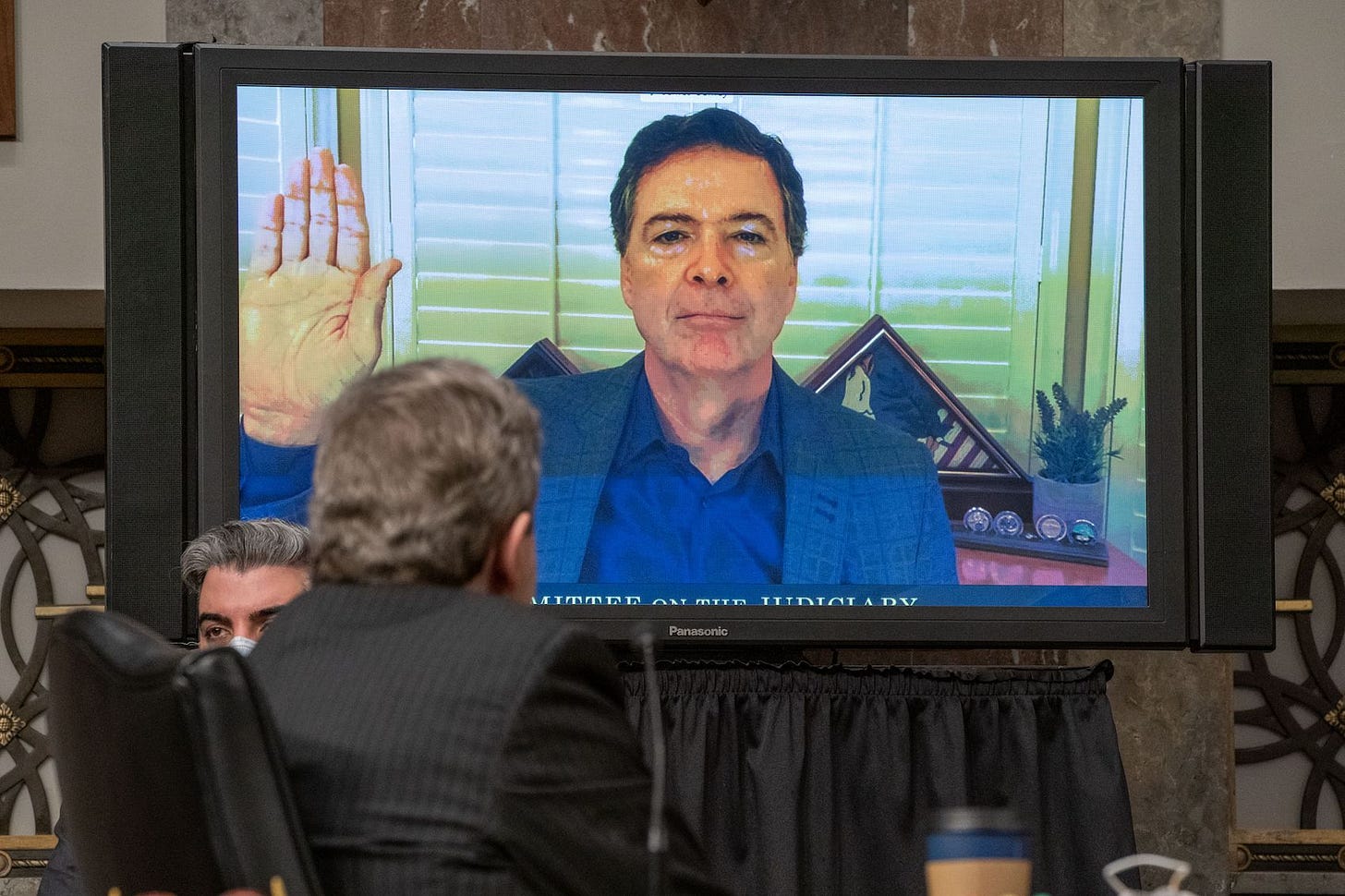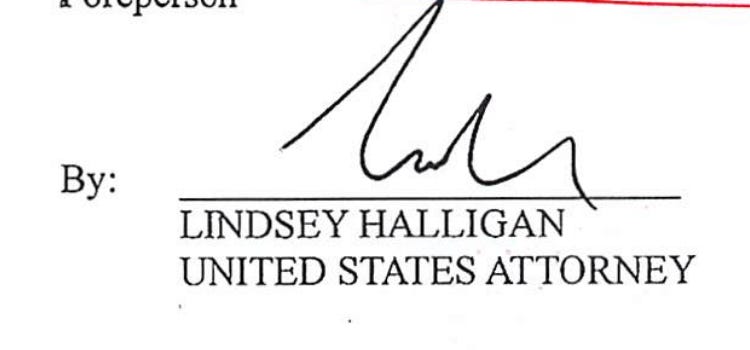Tonight in Your Rights: The Trump-ordered prosecution
What to know about Comey's indictment, recent shadow docket orders, and why Trump keeps talking about Tylenol.

James Comey’s arraignment has been set for Oct. 9.
All Rise News plans to cover it live.
Former FBI director James Comey’s two-page indictment inaugurates a new type of criminal case: the Donald Trump-ordered prosecution.
Even during his first term, Trump pushed to prosecute his political enemies at least a dozen times, including Hillary Clinton, Andy McCabe, and Joe Biden. Comey isn’t even a new target for Trump. In 2018, The New York Times reported that Trump had to be rebuffed by his White House counsel Don McGahn from ordering Comey and Clinton’s prosecution, a piece of relevant context for this week’s events lost to historical amnesia.
Back then, Trump’s most brazen demands to prosecute his rivals went through his Justice Department for investigation — and in the case of Special Counsel John Durham, for prosecutions that collapsed more frequently than not.
In Trump 2.0, the age of the middleman is over: Trump openly decides whether to prosecute his political enemies, and any career prosecutor who disagrees must step aside.
Before Comey’s indictment, Trump forced former U.S. Attorney Erik Siebert to resign, replaced him with his personal fixer Lindsey Halligan, and publicly directed the pursuit of his political enemies “NOW.” Halligan reportedly disregarded the written warnings of career prosecutors that moving ahead raises serious ethical issues.
Despite returning an indictment, a grand jury rejected one of the three charges.
That failure speaks volumes: Grand juries typically only see the prosecution’s presentation of the evidence, vote on a charge by a simple majority, and only need to make their findings on the low threshold of probable cause of a crime. MSNBC found that only a thin majority of the grand jurors, 14 out of 23, voted even on those charges. By contrast, there is no evidence that grand juries rejected any of the 91 criminal charges in any of Trump’s four indictments.
During his presidency, Joe Biden avoided commenting on any of Trump’s cases.
What to know about Comey’s indictment
Though thin on details, both charges of Comey’s two-count indictment accuse him of lying to Congress while testifying remotely from his home in Virginia on Sept. 30, 2020.
Halligan, a former insurance lawyer with no prosecutorial experience, is the only Justice Department official who signed it.
In the document, Halligan claims Comey falsely denied that he “authorized someone else at the FBI to be an anonymous source in news reports” during questioning by Sen. Ted Cruz (R-Texas). Both of the charges, for perjury and obstruction of a congressional proceeding, hinge upon that statement.
Though the indictment doesn’t contain any more detail, ABC News is reporting that the prosecution’s theory of the case is that Comey authorized his close friend and former personal lawyer, Daniel Richman, to speak to the media. But the FBI’s own records of the leak investigation, codenamed Arctic Haze, show that Richman denies this.
“Richman claimed Comey never asked him to talk to the media,” the FBI’s records state.
On Sept. 19, The New York Times reported that prosecutors recently subpoenaed Richman, and Richman’s statements did not help their investigation.
Also, Cruz’s questions focused on McCabe, not Richman, and Comey’s responses simply stood by his earlier testimony from 2017. Prosecutors will need to prove that Comey knowingly gave false testimony during a line of questioning about a different person and that the statements were material to a congressional investigation.
(There is another theory of the case floated by legal commentators involving McCabe instead of Richman, which runs into a different problem for prosecutors: A Justice Department inspector general report would contradict the premise of that case, but early reporting currently suggests that the case is actually about Richman.)
The case has been assigned to U.S. District Judge Michael S. Nachmanoff, a Biden appointee, and Comey’s arraignment has been scheduled for Oct. 9 at 10 a.m. Eastern Time, which All Rise News plans to cover live.
Read the two-page indictment in full here.
The Roberts Court hands Trump more power
On Friday, the Supreme Court’s conservative supermajority let Trump withhold $4 billion in foreign aid approved by Congress in a so-called “pocket rescission.”
Trump complained that a lower court’s order stopping him from doing that would force the government to “enter into negotiations” with “foreign states or international organizations.”
On behalf of all three of the court’s liberal wing, Justice Elena Kagan wrote that the majority’s decision “conflicts with the separation of powers.”
“If those laws require obligation of the money, and if Congress has not by rescission or other action relieved the Executive of that duty, then the Executive must comply,” the dissent states. “It cannot be heard to complain, as it does here, that the laws clash with the President’s differing view of ‘American values’ and ‘American interests.’ … That inconsistency, in other words, is not a cognizable harm, to be weighed in the equitable balance. It is merely a frustration any President must bear.”
This is the latest of dozens of Trump victories, mostly by 6-3 margins, on the Supreme Court’s so-called shadow docket, emergency rulings decided without full briefing or arguments on the merits.
In another dramatic example from earlier this week, the Supreme Court also let Trump fire FTC commissioner Rebecca Slaughter, in another shadow docket order seen as the death knell of the nearly century-old precedent of Humphrey’s Executor.
But the decision goes even farther than that, as I break down here on Legal AF.
Demystifying Trump’s sudden interest in Tylenol
Why is Trump suddenly talking so much about Tylenol when he can’t even pronounce acetaminophen?
Two journalistic principles apply: Follow the money, and follow the lawyers.
Earlier this week, The Wall Street Journal ran an editorial titled “Trump, Tylenol and the Plaintiffs Bar,” finding common ground with Sen. Liz Warren (D-Mass.) in questioning Robert F. Kennedy Jr.’s conflicts of interests involving law firms suing over alleged pharmaceutical links to autism.
The editorial reads:
“So why the sudden alarm, complete with a presidential presser? The Occam’s razor answer is the influence of RFK Jr., who is carrying water for his friends in the plaintiffs bar. A who’s-who of lawsuit shops are pushing the Tylenol-autism link in federal court. The litigants include the Lanier Law Firm, Beasley Allen, Cooper Law Partners, and Keller Postman. Most have been allies of Mr. Kennedy in other mass torts, such as against the weed-killer Roundup and Merck’s HPV vaccine.”
After a scathing rebuke of the lawsuit in the lower court, a federal appeal is imminent, as I break down in the interview below.
You can find more videos from the All Rise News collaborations with the MeidasTouch Network’s Legal AF by clicking on the playlist here.





Great reporting and perspective on the Comey indictment. You fill in so much important detail that the mainstream press either ignores or doesn't understand.
Thanks Adam: Sounds like the shadow docket is operating in the shadows. One only stacked supreme court belonging to Donald Trump. Thanks to Mitch McConnell not allowing Obama to appoint Judge Merrick Garland’s nomination to the U.S. Supreme Court to replace Justice Antonin Scalia because it was too close to an election. Trumps appointments of Gorsuch, Kavanaugh and Barrett pretty well sealed the deal. So much for independent departments. Total control to Trump